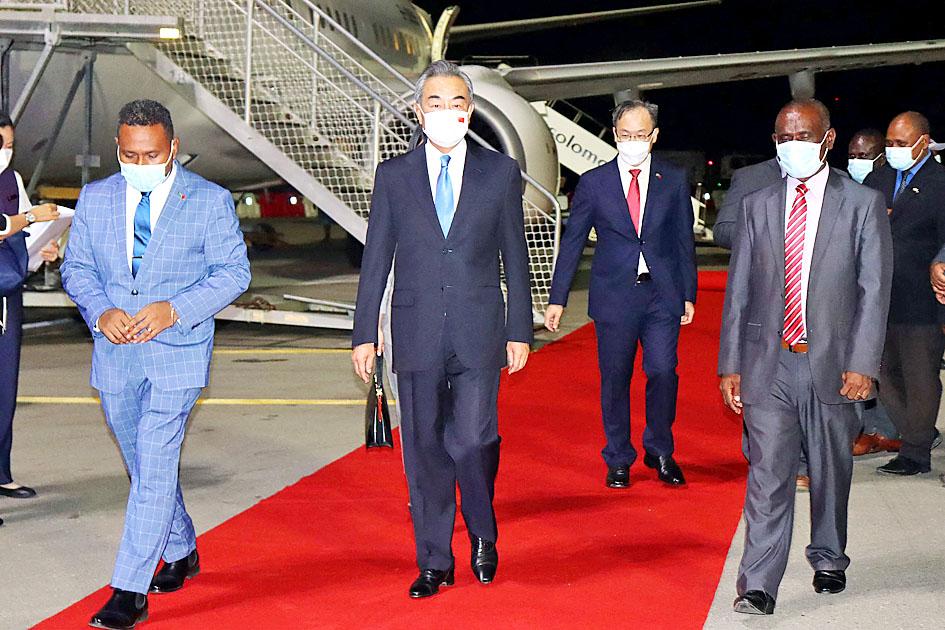The Ministry of Foreign Affairs yesterday called on Pacific island countries to heed China’s true purpose behind its aid, as Chinese Minister of Foreign Affairs Wang Yi (王毅) arrived in the Solomon Islands at the start of an eight-nation tour.
His visit came amid growing concerns about Beijing’s military and financial ambitions in the South Pacific region, after a draft document was leaked showing that he hoped to strike a sweeping agreement with 10 Pacific nations on everything from security to fisheries.
In Taipei, Ministry of Foreign Affairs deputy spokesman Tsuei Ching-lin (崔靜麟) said that it would continue to pay close attention to Wang’s visit.

Photo: AFP
Since China launched its Belt and Road Initiative, countries such as Sri Lanka have been caught in a debt trap, and hit by major crises to their economies and social development, he said.
Tensions in the region have been heightened by Beijing’s ambition to expand its power through military strategies, a clear example of which is China signing a security deal with the Solomon Islands, he added.
The ministry called on countries in the region to recognize that China intends to expand its authoritarian power, Tsuei said, adding that only freedom and democracy can bring stability.
Taiwan has strong relationships with Pacific allies and is committed to continue working with like-minded countries to create a free, open, peaceful and prosperous Pacific region, he said.
In Honiara, Wang commented on reports about a leaked security agreement, which contained a provision that would allow Chinese naval deployments to the Solomon Islands.
“It is not imposed on anyone, nor is it targeted at any third party. There is no intention at all to establish a military base,” Wang told a news conference after meeting with Solomon Islands Minister of Foreign Affairs Jeremiah Manele.
Australia’s former government, toppled in elections last week, had said that any move to create a Chinese military base would amount to crossing a “red line,” without specifying the consequences.
“China’s cooperation with Pacific island countries does not target any country, and should not be interfered or disrupted by any other country,” he said.
Canberra scrambled to counter Wang’s trip by sending Australian Minister of Foreign Affairs Penny Wong (黃英賢) to Fiji to shore up support in the Pacific.
She had been on the job just five days following recent Australian elections and had just returned on Wednesday night from a meeting in Tokyo.
In Fiji, Wong said it was up to each island nation to decide what partnerships they formed and what agreements they signed, but urged them to consider the benefits of sticking with Australia.
“Australia will be a partner that doesn’t come with strings attached nor imposing unsustainable financial burdens,” Wong said. “We are a partner that won’t erode Pacific priorities or Pacific institutions.”

SECURITY: As China is ‘reshaping’ Hong Kong’s population, Taiwan must raise the eligibility threshold for applications from Hong Kongers, Chiu Chui-cheng said When Hong Kong and Macau citizens apply for residency in Taiwan, it would be under a new category that includes a “national security observation period,” Mainland Affairs Council (MAC) Minister Chiu Chui-cheng (邱垂正) said yesterday. President William Lai (賴清德) on March 13 announced 17 strategies to counter China’s aggression toward Taiwan, including incorporating national security considerations into the review process for residency applications from Hong Kong and Macau citizens. The situation in Hong Kong is constantly changing, Chiu said to media yesterday on the sidelines of the Taipei Technology Run hosted by the Taipei Neihu Technology Park Development Association. With

CARROT AND STICK: While unrelenting in its military threats, China attracted nearly 40,000 Taiwanese to over 400 business events last year Nearly 40,000 Taiwanese last year joined industry events in China, such as conferences and trade fairs, supported by the Chinese government, a study showed yesterday, as Beijing ramps up a charm offensive toward Taipei alongside military pressure. China has long taken a carrot-and-stick approach to Taiwan, threatening it with the prospect of military action while reaching out to those it believes are amenable to Beijing’s point of view. Taiwanese security officials are wary of what they see as Beijing’s influence campaigns to sway public opinion after Taipei and Beijing gradually resumed travel links halted by the COVID-19 pandemic, but the scale of

A US Marine Corps regiment equipped with Naval Strike Missiles (NSM) is set to participate in the upcoming Balikatan 25 exercise in the Luzon Strait, marking the system’s first-ever deployment in the Philippines. US and Philippine officials have separately confirmed that the Navy Marine Expeditionary Ship Interdiction System (NMESIS) — the mobile launch platform for the Naval Strike Missile — would take part in the joint exercise. The missiles are being deployed to “a strategic first island chain chokepoint” in the waters between Taiwan proper and the Philippines, US-based Naval News reported. “The Luzon Strait and Bashi Channel represent a critical access

Pope Francis is be laid to rest on Saturday after lying in state for three days in St Peter’s Basilica, where the faithful are expected to flock to pay their respects to history’s first Latin American pontiff. The cardinals met yesterday in the Vatican’s synod hall to chart the next steps before a conclave begins to choose Francis’ successor, as condolences poured in from around the world. According to current norms, the conclave must begin between May 5 and 10. The cardinals set the funeral for Saturday at 10am in St Peter’s Square, to be celebrated by the dean of the College